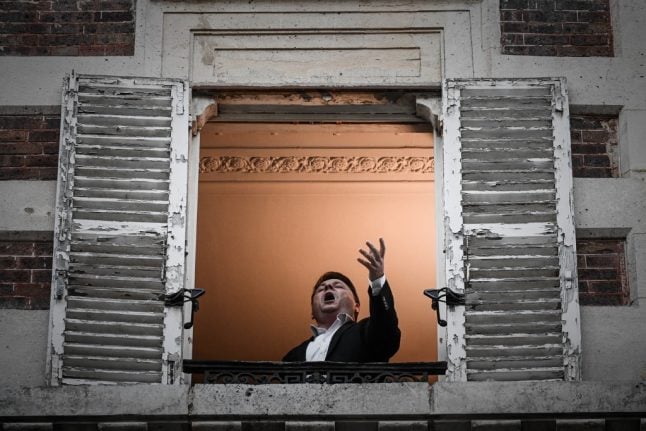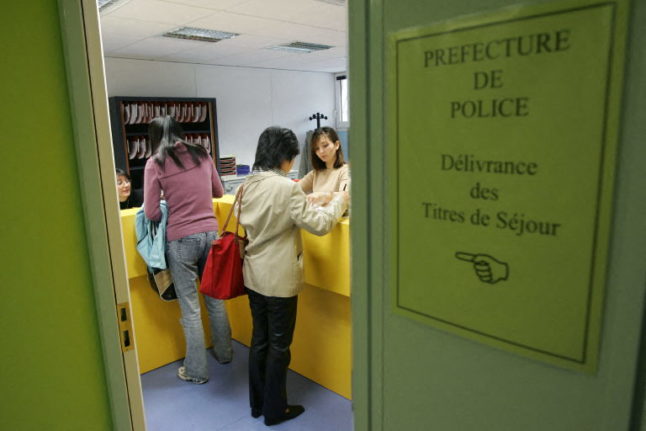Every evening at 7pm, tenor Stephane Senechal throws open the window of his apartment in Paris's 9th arrondissement and lets fly with an aria.
“When I see the smile that I bring each evening with my song, that gives me great pleasure,” he told AFP.
“All day long, we are told of tragic things, of the dead. When I see smiles, I see hope. It's a little moment of freedom, of escape,” he said.
Senechal said he lives in a neighbourhood where “there are a lot of elderly people” and that it was an 80-year-old neighbour's moment of reflection at the beginning of the lockdown that pushed him to sing at his window.

Stephane Senechal's “moment of escape” from all the tragedies the coronavirus brings is joy to his neighbours. Photo: AFP
Celebrate life
“She told me 'we will feel even more isolated'. I was rehearsing the role of Don Jose in “Carmen” at the time and after this remark I decided to sing at the window,” he said.
Senechal starts by singing the “Marseillaise”. Then he links each nightly recital with arias as varied as “I gave you my heart” from Franz Lehar's operetta “The Land of Smiles”, the 1935 Mexican song “Piensa en mi” – sung by Luz Casal in Pedro Almodovar's High Heels – as well as the song “Caruso”, Edith Piaf's “The Hymn to Love” and an “Ave Maria” dedicated “to all the suffering”.
Senechal also likes to let go with “E Lucevan le stelle” from Puccini's opera Tosca. He considers this especially apt because of its last sentence: “'E non ho amato mai tanto la vita! (I have never loved life so much)' We understand the importance of life. And we can't give up now,” he says.
His balcony recitals appear to have drifted far across the rooftops of the 9th. “A patient with COVID-19 and hospitalised in Bichat (a hospital in the north of Paris) saw one of my videos and said 'keep going'. For me, that makes it all worthwhile.”
Since the start of self-isolation in France, as in Italy and Spain, initiatives like this have flourished. Montreuil, in the eastern suburbs of the capital, has been particularly active, regularly sharing videos of a violinist, a guitarist or a singer on their balconies.
The “BachDesBalcons” online initiative, launched by Classical Revolution France, a movement imported from the United States, encourages musicians to play Bach at their windows.
READ ALSO: How to have a virtual night out in France during lockdown

Symphonic Orchestra violinist Jessy Koch performs on her balcony every day day to support health workers in Mulhouse, one of the towns that the coronavirus struck earliest and hardest. Photo: AFP
Across the nation
“There are dozens of us playing every week from Montpellier to Paris, via Nantes, Strasbourg or Lille,” Sarah Niblack, director of Classical Revolution France, told AFP. “Bach is the greatest of companions, you are never alone with your music.”
An American who has lived in France for several years, Niblack has been based in Prades, in the south-west, since the beginning of confinement, and says she is happy to bring “comfort and a little moment when people come together” in these times of isolation.
“People recognise me now, even when I do my shopping with mask and gloves, I am told in the street 'you are the girl who plays Bach',” said Niblack, a violinist who has played in several national orchestras.
Like many freelance workers she has suffered professionally from the lockdown, having seen six contracts cancelled since the outbreak, but she remains upbeat about the power of music.
“We are not useful in a hospital but we can make a little difference in people's lives. They appreciate that we are thinking of them.”
READ ALSO: Apéro Skype – France's evening lockdown drinks ritual

French cellist Camilo Peralta playing on his balcony in Paris. Photo: AFP
Also in Paris, from his balcony overlooking Boulevard Saint-Michel, in the heart of the bohemian Latin quarter, Camilo Peralta, a cellist with the Ile-de-France National Orchestra, plays Bach suites at noon, much to the pleasure of neighbours and the occasional passer-by.
“We are inevitably caught up in the situation because every time I play, an ambulance drives by,” he said.
In Mulhouse, in the east of the country, one of the areas hardest hit by the epidemic, the violinist Jessy Koch plays every day at 6.30pm on her balcony.
“It is not easy to work alone, without a purpose in mind. And now, I started to have a little audience waiting for the little concert. Life goes on,” she said.



 Please whitelist us to continue reading.
Please whitelist us to continue reading.
Member comments